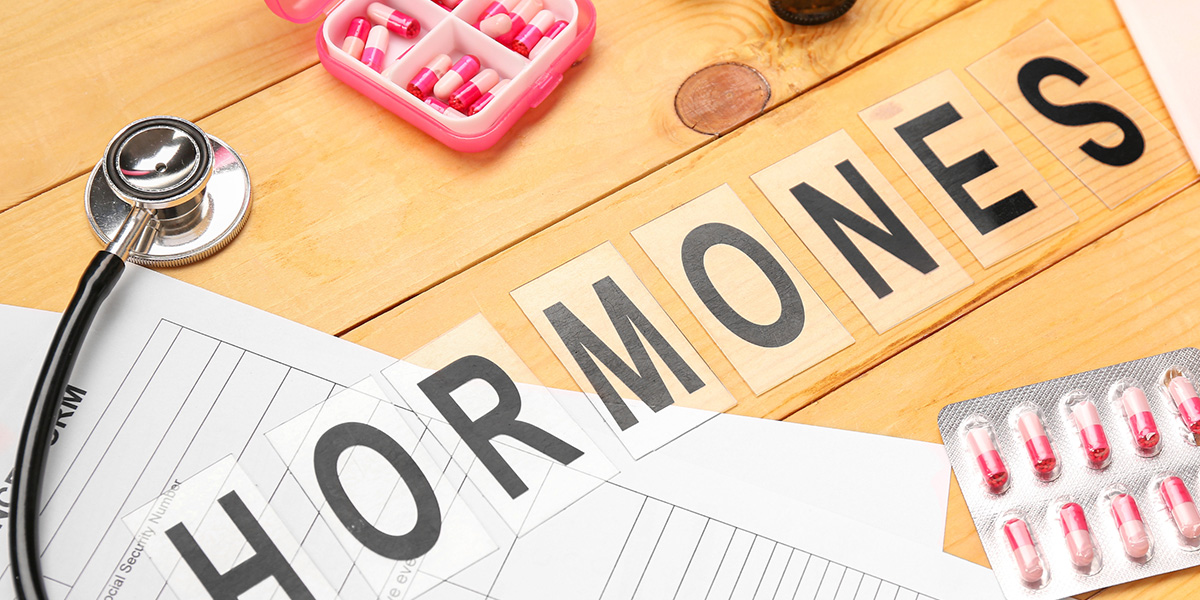
7 Best Supplements To Help Balance Hormones
Fatigue, sleep issues, mood imbalances, digestive discomfort, thinning hair, brittle nails, low sex drive, menstrual issues, menopausal symptoms, fertility troubles… If any of these sound familiar, you may be dealing with hormone imbalances. These imbalances can affect key glands in your endocrine system, such as the thyroid gland or pituitary gland, and disrupt insulin levels or stress hormone regulation.
The good news is, there are natural ways to support your hormone health and alleviate these symptoms. With the right supplements to balance hormones, you can give your body the tools it needs to restore balance.
Understanding Hormonal Imbalance
Your hormones regulate important functions in your body, including metabolism, reproduction, sleep, and mood. Hormonal balance is critical for maintaining your overall health. When your hormones are in balance they can support healthy energy levels, restorative sleep, physical wellness, emotional well-being, and mental clarity.
Hormonal imbalances may show up in different ways. They can affect your physical, mental, and emotional well-being and lead to an array of symptoms. These imbalances may result from issues within the thyroid gland, pituitary gland, or broader endocrine system. They can also be linked to conditions like insulin resistance, which disrupts blood sugar and energy levels, or an imbalance of the hormone estrogen.
Common symptoms of hormonal imbalances and their impact on daily life may include:
- Fatigue and sleep issues: fatigue, lethargy, poor sleep, and insomnia
- Menstrual issues: irregular menstrual cycle, PMS symptoms, and painful periods
- Menopause symptoms: symptoms of perimenopause, menopause, and post-menopause
- Reduced libido: low sex drive
- Fertility issues: infertility issues in both female and male
- Weight changes: Gaining or losing weight without an explanation
- Digestive issues: Bloating, constipation, or diarrhea
- Mood changes: mood swings, irritability, anxiety, or depression
- Skin, hair, and nail issues: Dry skin, acne, redness, eczema, hair thinning, and brittle nails
Fortunately, these symptoms can often be improved through targeted treatment strategies that uncover and address the root causes of your hormonal imbalances. Whether it’s supporting your thyroid gland, regulating insulin levels, or calming stress hormones, specific supplements can provide key health benefits.
While some cases might require hormone replacement therapy, many people can benefit from natural solutions that work with the body. These hormone-support strategies often involve supplements to balance hormones effectively.
The Best Supplements to Balance Hormones
The best supplements that can help to balance hormones include:
- Omega-3 fatty acids
- Magnesium
- Vitamin D
- Adaptogenic herbs
- Probiotics
- Zinc
- Evening primrose oil
In the next sections, we will explain the science-back hormone-balancing benefits of each of these supplements.
Omega-3 Fatty Acids

Omega-3 fatty acids are among the best supplements to balance hormones.
Reduces Inflammation and Supports Hormone Production
Omega-3 fatty acids are anti-inflammatory fatty acids, especially their eicosapentaenoic acid (EPA) and docosahexaenoic acid (DHA) forms. According to a 2008 review published in Subcellular Biochemistry, they help to modulate the production of inflammatory cytokines and other inflammatory mediators (1). This can help to reduce chronic inflammation and related inflammatory health conditions, including autoimmune disease, arthritis, cardiovascular disease, and chronic pain (2, 3).
Omega-3 fatty acids also support hormone production. By allowing the proper synthesis of hormones, supporting cell membrane fluidity, and supporting signaling pathways, they support your reproductive health, metabolism, mood, and overall hormonal function. According to a 2004 review published in the Obstetrical & Gynecological Survey, omega-3 fatty acids may benefit women in various ways, including during pregnancy, menopause, and post-menopause (4).
Supports Brain and Mental Health
Omega-3 fatty acids, DHA in particular, are critical for healthy brain tissue and neural membrane function. Omega-3 fatty acids also support brain cell growth and neuronal communication. They can be incredibly beneficial for various cognitive functions, including memory, focus, and concentration (5, 6).
Omega-3 fatty acids can help to reduce the risk and alleviate the symptoms of anxiety, depression, and neurodegenerative conditions by reducing chronic inflammation, decreasing oxidative stress, and supporting brain function (7, 8). According to a 2023 review published in Frontiers in Psychiatry, omega-3s may lower the risk of several psychiatric conditions, including postpartum depression, major depression, psychosis, and dementia (9).
Best Sources of Omega-3 Fatty Acids
The best food sources of omega-3 fatty acids include fatty fish, such as salmon, mackerel, and sardines. Flaxseeds, chia seeds, hemp seeds, and walnuts are also loaded with omega-3, however they contain the ALA form. ALA is converted in your body into EPA and DHA which your body can use.
Fish and seafood contain EPA and DHA which are bioavailable to your body without conversion. If you are looking for plant-based EPA and DHA sources of omega-3s, algae is your option. For omega-3 supplementation to balance hormones, we recommend wish oil supplements or for vegans and vegetarians, algae supplements with EPA and DHA. You will likely need more capsules from algae supplements as they tend to be lower dosage per pill.
Magnesium

Magnesium is another one of the supplements we recommend to balance hormones.
Decreases Stress and Supports Sleep
Magnesium is an important mineral with many roles in the body. It helps your body to regulate cortisol and manage the stress response. If your cortisol levels are high due to chronic stress, it can result in chronic inflammation, sleep issues, fatigue, and anxiety.
Magnesium supports the hypothalamic-pituitary-adrenal (HPA) axis and helps to maintain normal cortisol levels keeping you calm (10). According to a 2012 research published in Neuropharmacology, this may play a role in reducing anxiety (10). Magnesium also supports gamma-aminobutyric acid (GABA) production. GABA is important for supporting relaxation, reducing stress, and decreasing the potential negative effects of long-term stress (11).
Since magnesium supports your nervous system and helps to reduce stress, it may not be surprising that it can aid sleep too. It increases melatonin production and may reduce the risk of insomnia. According to a 2023 review published in Biological Trace Element Research, magnesium may help to improve sleep duration and sleep quality (12).
Regulates Menstruation
Moreover, magnesium may help to regulate your menstrual health. Magnesium can regulate hormonal fluctuation which can help to regulate your menstrual cycle and reduce related symptoms. According to a 2024 study published in the International Journal of Women’s Health and Reproduction Sciences, 150 to 300 mg of magnesium may help to reduce menstrual symptoms, including headaches, back pain, cramping, abdominal pain, irritability, and depression (13).
By supporting muscle relaxation, it may reduce uterine contractions and decrease pain and cramps during your period. By supporting your nervous system, lowering stress, and reducing muscle tension, magnesium may also reduce mood swings and mood imbalances related to PMS.
Best Sources of Magnesium
The best food sources of magnesium include leafy greens, nuts, seeds, whole grains, and dark chocolate. However, due to our depleted soils, these foods are even lower in magnesium than they should be. Magnesium supplementation is beneficial for most of us.
For magnesium supplementation, we recommend magnesium glycerine, magnesium l-threonate, magnesium citrate, or magnesium malate (14, 15). We don’t recommend magnesium oxide, dihydroxide, milk of magnesia, sulfate, aspartate, and carbonate forms as they don’t absorb well and are not very bioavailable. You may choose capsule or powder forms of magnesium supplements to balance hormones. Powders are popular as sleep supplements. For muscle and joint pain, there are also topical magnesium supplements.
Vitamin D

Vitamin D is one of the best supplements to balance hormones.
Supports Thyroid Function and Reproductive Hormone Balance
Vitamin D is a fat-soluble vitamin needed for calcium absorption, and bone, muscle, and immune health (16). It also plays a critical role in regulating your thyroid hormone levels. Your thyroid hormones are necessary for healthy energy levels, metabolism, and overall hormonal health (17). Vitamin D supports the synthesis and secretion of thyroid hormones, which allows proper cellular repair, cellular development, and cellular growth.
Since vitamin D is critical for hormonal health, it may not be surprising that it plays a key role in the function of reproductive hormones, including estrogen and testosterone. This is critical for menstrual health, reproductive function, and fertility. It may reduce the risk and symptoms of hormone-related conditions. For example, according to a 2023 review published in the Annals of Medicine and Surgery, it may be beneficial for those with polycystic ovary syndrome (PCOS) (18).
Improves Mood and Energy Levels
Vitamin D is critical for your mood, mental health, and energy. It affects the production of the neurotransmitter serotonin, which has an influence on your mood, sleep, energy levels, and appetite. Normal vitamin D levels support normal serotonin production, which can help boost your mood. On the other hand, vitamin D deficiency may increase the risk of seasonal affective disorder (SAD), depression, anxiety, and mood imbalances (19, 20).
Vitamin D also supports mitochondrial function and muscle strength. Low levels of vitamin D can lead to fatigue and poor physical performance. According to a 2024 research published in Nutrients, vitamin D may help with fatigue mitigation (21). Healthy vitamin D levels may support normal energy levels, physical endurance, mental sharpness, and vitality.
Best Sources of Vitamin D
Sunshine is the best source of vitamin D. As it hits your skin, your body can make vitamin D. However, most of us don’t spend enough time out in the sun and many of us live in gloomy climates. The best food options for vitamin D include fatty fish like salmon, mackerel, and sardines, along with fortified foods and egg yolks. However, these don’t provide nearly enough vitamin D either.
Vitamin D supplementation is critical for most people. We recommend using a vitamin D3/K2 supplement daily. Vitamin K2 helps vitamin D3 action, the two work together.
Adaptogenic Herbs

Adaptogenic herbs are great supplements to balance hormones.
Manages Stress and Cortisol Levels
Adaptogenic herbs are known for their ability to regulate cortisol and manage stress levels better. Ashwagandha is one of the best adaptogens for balancing stress and cortisol. Among other research, a 2016 study published in Medicine (Baltimore) has discussed its potential stress-relieving properties (22). This herb can modulate the HPA axis which can help your body to regulate the stress response, reduce cortisol levels, lower anxiety, and promote calmness. Ashwagandha may also help to improve mental focus and clarity even in stressful situations.
Supports Reproductive Health and Boosts Energy
Adaptogenic herbs may also help to support health energy levels and reproductive health. Maca root may be the best adaptogenic herbal supplement to balance hormones, support reproductive health, and boost energy. In the world of herbal and natural medicine, maca is known for its ability to balance hormone levels, improve libido, and support fertility. It may also help to improve your energy levels, enhance stamina, reduce stress, and lower fatigue (23, 24). According to a 2022 paper published in Nutrients, maca may offer energy-improving and antioxidative benefits (25).
Best Sources of Adaptogens
Ashwagandha and maca root are among the two best adaptogens for hormonal balance, as they support the adrenal glands and help regulate cortisol levels. Rhodiola rosea and holy basil are also great options for decreasing stress and improving hormonal balance. Adaptogens can be found at health food forms in powder and capsule forms and within various superfood and tea mixes.
Probiotics

We can’t forget about probiotics as one of the best supplements to balance hormones.
Aids Gut Health and Hormone Regulation
Your gut flora is connected to everything from your brain to your hormonal health. Probiotics are beneficial bacteria that support your gut microbiome health. A balanced gut microbiome allows the proper digestion of food and absorption of nutrients which is key to hormone production and regulation. A healthy gut flora also helps your body to recycle and detoxify hormones, reducing hormonal imbalances, decreasing the risk of health issues related to hormonal fluctuations and imbalances, and maintaining hormonal homeostasis. According to a 2021 study published in the European Review for Medical and Pharmacological Sciences, probiotics may support the hormonal health of perimenopausal women (26).
Supports Estrogen Metabolism and Reduces PMS Symptoms
Probiotics can also aid estrogen metabolism and as a result, decrease PMS symptoms and other hormonal symptoms. According to a 2024 study published in Women’s Health (London), probiotics may help women with dysmenorrhea in terms of mental health as well (27).
The estrobolome refers to a group of gut bacteria responsible for metabolizing and regulating the body’s circulating estrogen levels. Probiotics support the estrobolome and your body’s ability to process and remove excess estrogen. This can help to reduce estrogen dominance which is partly responsible for menstrual irregularities, bloating, and other PMS and menstrual symptoms. Thus probiotics may help to reduce cramps and other symptoms of PMS by lowering inflammation and regulating hormone balance.
Best Sources of Probiotics
The best food sources of probiotics include fermented food, such as kimchi, sauerkraut, fermented herbs, fermented vegetables, yogurt, kefir, and kombucha. We also recommend daily probiotic supplements. Look for a high-quality probiotic supplement with at least 10 strains of bacteria and at least 50 billion CFUs to get a good variety and a good number of probiotics for hormone balance.
Zinc

Zinc is another great supplement to balance hormones we recommend for hormone and immune health.
Regulates Testosterone and Supports Reproductive Health
Zinc is a powerful mineral that may help to regulate testosterone levels and support reproductive health. According to a 2018 research published in the Journal of Reproduction and Infertility, zinc may be important for male reproduction and fertility, and according to a 2021 study published in Biology of Reproduction, it may also help female reproduction (28, 29).
Testosterone is the male reproductive hormone that helps libido, muscle growth, hormonal balance, and overall vitality in both sexes. In men, it’s essential for sperm production and sperm quality, while in women, it supports egg maturation and ovulation.
Supports Immune System Balance and Skin Health
Beyond reproductive health, some of the best-known benefits of zinc and immune and skin support. Zinc may help to regulate the inflammatory response and strengthen your immune cells to aid the body in fighting off pathogens. According to a 2023 review published in Nature, zinc may help to fight respiratory infections (30). Moreover, by decreasing inflammation and supporting collagen synthesis, it may help to reduce the risk of various skin conditions, such as acne and eczema (31, 32).
Best Sources of Zinc
The best food sources of zinc include oysters, red meat, poultry, beans, nuts, seeds, and whole grains. We also recommend zinc supplements to balance hormones.
There are many different kinds of zinc supplements. Zinc picolinate and zinc citrate tend to absorb better in the body than other forms. You may find both capsules and liquid dropper forms on the market. For immune health and respiratory issues, there are also zinc lozenges.
Evening Primrose Oil

Finally, evening primrose oil is a fantastic supplement to balance hormones.
Reduces PMS and Menopause Symptoms
Evening primrose oil is a plant-based oil rich in gamma-linolenic acid (GLA), an omega-6 fatty acid. One of the main benefits of GLA in evening primrose oil is alleviating PMS and menopause symptoms (33). Prostaglandins are compounds that affect hormonal balance and inflammation levels. By regulation prostaglandin production, GLA may help to reduce hormonal fluctuations, which may lead to bloating, breast tenderness, night sweats, hot flashes, and other PMS, menopause, and hormonal symptoms. According to a 2023 study published in the International Journal of Clinical Obstetrics and Gynaecology, the combination of evening primrose oil, vitamin B6, and tocotrienol may help with PMS (34).
Promotes Skin Health and Reduces Inflammation
By reducing inflammation and supporting the skin’s moisture barrier, evening primrose oil may also help to improve your skin health. According to a 2005 study published in the International Journal of Cosmetic Science, evening primrose oil may aid the biophysical parameters of the skin (35). It may help to support skin cell regeneration and decrease oxidative stress. It may reduce dryness, redness, irritation, and swelling, and the risk of acne, eczema, psoriasis, and other skin issues, which you may develop due to chronic inflammation and hormonal imbalances.
Best Sources of Evening Primrose Oil
You can find various Evening primrose oil supplements on the market. Choose a cold-pressed evening primrose oil in soft gel capsules or liquid form. These forms tend to retain the maximum gamma-linolenic acid (GLA) content without chemical processing and are bioavailable.
Natural Hormone Balance Can Improve Your Quality of Life
Balancing hormones naturally can significantly improve physical and emotional well-being. Incorporating these supplements into your routine, along with a healthy diet and lifestyle, can help restore harmony to your body. Always consult a healthcare provider before starting new supplements.
If you are looking for further advice on how to support your health and how to use supplements to balance your hormones, we recommend that you reach out to us. If are dealing with hormonal imbalances, chronic symptoms, or complex health issues, our practitioners can help to find the root cause of your issues, address these underlying imbalances naturally, and regain your health and well-being. We invite you to set up an appointment with our office here.
